#puberty blockers
Text
[URGENT] UK NHS consultation on puberty blockers
VERY SHORT DEADLINE! (Wednesday 1st November 2023)
The UK's National Health Service (NHS) are about to ban puberty blockers for all trans adolescents, except for a small group who are eligible and willing to be research subjects.
"As part of this NHS England-led process, the National Institute for Health and Care Excellence (NICE) was commissioned to review the published evidence. Overall, there was no statistically significant difference in gender incongruence, mental health, body image and psychosocial functioning in children and adolescents treated with PSH."
-- 6-page introductory PDF to consultation
That's because puberty blockers don't change gender characteristics by definition, you absolute donuts.
They're carrying out a consultation on this because they have to, and there's only two days left. If you are in the UK and you are a young trans person or know any young trans people, please check out this consultation.
Need help answering the questions? Here's a couple of handy links:
Here's a really helpful article about the consultation and some persuasive arguments you could include in your answers, from What The Trans!
Abigail Thorn outlines some excellent points on Trans Writes.
Mermaids, a UK charity supporting trans kids and their families, has a guide for responding to the consultation, too.
Here's the first question, to help you work out if you're in the target group:

In "other", you could put anything like "friend of a trans adolescent", "family member of a trans child", etc. If you're a trans adult who was on blockers or who would have been on blockers if waiting lists had been shorter or family/doctors had been more supportive etc, choose "patient".
Click here to participate.
Deadline: Wednesday 1st November 2023.
2K notes
·
View notes
Text
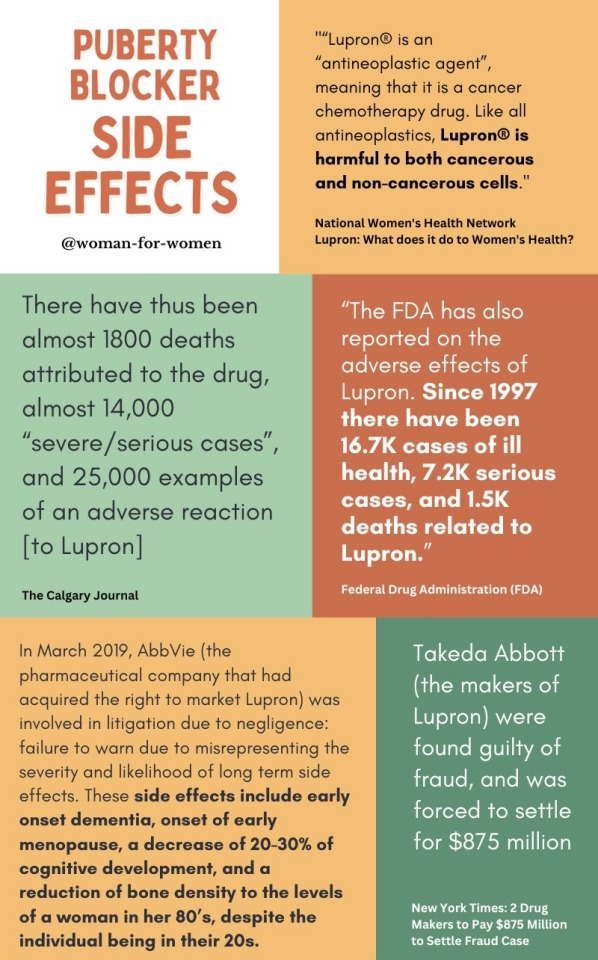
"For years, Sharissa Derricott, 30, had no idea why her body seemed to be failing. At 21, a surgeon replaced her deteriorated jaw joint. She’s been diagnosed with degenerative disc disease and fibromyalgia, a chronic pain condition. Her teeth are shedding enamel and cracking.
None of it made sense to her until she discovered a community of women online who describe similar symptoms and have one thing in common: all had taken a drug called Lupron.
Thousands of parents chose to inject their daughters with the drug, which was approved to shut down puberty in young girls but also is commonly used off-label to help short kids grow taller.
The drug’s pediatric version comes with few warnings about long-term side effects. It is also used in adults to fight prostate cancer or relieve uterine pain and the Food and Drug Administration has warnings on the drug’s adult labels about a variety of side effects.
More than 10,000 adverse event reports filed with the FDA reflect the experiences of women who’ve taken Lupron. The reports describe everything from brittle bones to faulty joints.
In interviews and in online forums, women who took the drug as young girls or initiated a daughter’s treatment described harsh side effects that have been well-documented in adults.
Women who used Lupron a decade or more ago to delay puberty or grow taller described the short-term side effects listed on the pediatric label: pain at the injection site, mood swings and headaches. Yet they also described conditions that usually affect people much later in life. A 20-year-old from South Carolina was diagnosed with osteopenia, a thinning of the bones, while a 25 year-old from Pennsylvania has osteoporosis and a cracked spine. A 26 year-old in Massachusetts needed a total hip replacement. A 25-year-old in Wisconsin, like Derricott, has chronic pain and degenerative disc disease.
“It just feels like I’m being punished for basically being experimented on when I was a child,” said Derricott, of Lawton, Okla. “I’d hate for a child to be put on Lupron, get to my age and go through the things I have been through.”
PBS - Women fear drug they used to halt puberty led to health problems (2017)
#w4w post#w4w infographic#stats#dysphoria#dysphoric#gender dysphoria#feminism#feminist#lupron#puberty blockers#transition#hrt
635 notes
·
View notes
Text
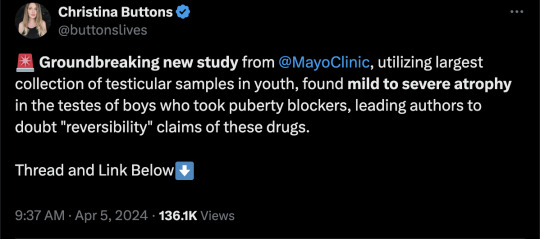
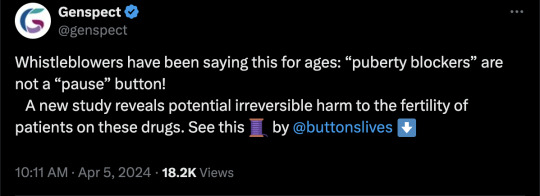
By: Christina Buttons
Published: Apr 4, 2024
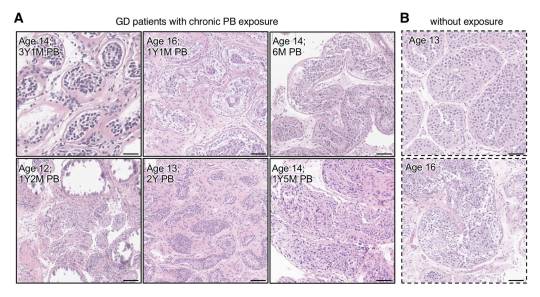
[ Figure 2: Representative images of Hematoxylin and Eosin-stained sections of testicular tissue biopsied from the testis from GD patients (A) with and (B) without PB exposure. ]
In a groundbreaking study from the Mayo Clinic, a globally recognized leader in medical research and patient care, researchers examined the effects of puberty blockers on testicular development in gender dysphoric male children. Their investigation revealed evidence of mild to severe atrophy in the sex glands of these children, leading the authors to express doubt in the claims of “reversibility” often made about puberty blockers.
The authors assert, “We provide unprecedented histological evidence revealing detrimental pediatric testicular sex gland responses to [puberty blockers].”
This preprint study, not yet peer-reviewed, presents evidence that puberty blockers induce significant cellular changes, impacting testicular development and sperm production in ways that are not fully reversible, with potentially permanent effects on testicular function and fertility. It challenges the longstanding view of puberty blockers as a reversible "pause button" on puberty.
As noted by the researchers of this study, no long-term studies exist for the use of puberty blockers in the context of stopping puberty for gender dysphoric children, and many potential health consequences remain unknown. In particular, the long-term impact on reproductive health is uncertain, making this study critical for filling this knowledge gap.
To address these unknowns, the Mayo Clinic has established the largest collection of testicular samples for patients aged 0-17 years, including those with gender dysphoria who have and have not yet received puberty blocker treatment, creating a database of over 130,000 individual cells for analysis.
Using a novel approach, the research team meticulously analyzed testicular tissue samples from youths undergoing puberty blocker treatment, with those not on puberty blocker treatment serving as controls. This comparison provides important insights into the potential cellular and molecular changes induced by these drugs.
Key Findings
The study utilized the Mayo Clinic's Pediatric Testicular Biobank for Fertility Preservation, which has been recruiting patients primarily from pediatric urology departments since 2015. Researchers analyzed testicular specimens from 87 young individuals (ages 0-17) undergoing fertility preservation surgery for various health reasons. Among these, 16 were gender dysphoric boys between the ages of 10 and 16, all of whom began identifying as transgender girls between the ages of 2 and 15. At the time of surgery, 9 patients (56%) were already on puberty blockers, with exposure ranging from 3 to 52 months. The authors noted that 100% of the 16 children would eventually go on to take them, highlighting “the widespread nature of PB intervention in this demographic.”
Among nine patients treated with puberty blockers, two exhibited unusual features in their testicles upon physical examination. One patient had abnormalities in both testicles, including incomplete development of the tunica albuginea, which is a protective covering around the testicles. The other patient had a right testicle that was difficult to detect.
In one part of the tissue-level analysis, over 400 testicular biopsy samples were analyzed and stained to examine the differences between those treated with puberty blockers and those who were not. Comparisons showed that testicular development in those treated with puberty blockers was abnormal compared to non-treated individuals. There was variability in how individuals responded to puberty blockers, leading to different outcomes in testicular development, including the degeneration of testicular tissues.
The study authors presented a case of a 12-year-old patient who underwent treatment with puberty blockers for 14 months. In this individual, 59% of the sex glands showed complete atrophy, along with the presence of microlithiasis—a condition where small clusters of calcium form in the testicles. This insight suggests that puberty blockers could lead to lasting structural changes. Additionally, research has shown a link between testicular microlithiasis and testicular cancer.

[ D) Representative images of normal (top) and fully atrophied sex gland (bottom). ]
This study also utilized single-cell analysis to investigate the effects of puberty blockers and aging on testicular cell composition. It took a very detailed look at individual cells from the testicles of a 14-year-old who had been on puberty blockers for over 4 years. The study analyzed a total of 130,100 cells, including 11,199 cells from the juvenile puberty blocker-treated patient.
The study observed that over 90% of the cells responsible for sperm production in this patient were stunted at an early developmental stage, unable to progress further. Additionally, it found "pathologically" higher and lower levels of two types of support cells (Sertoli cells) necessary for healthy sperm development. These findings suggest that puberty blockers can disrupt the normal maturation process of cells critical for sperm production.
In another part of the analysis, the authors found distinct cell-specific changes, including altered expression patterns of puberty-associated genes in endothelial cells, due to puberty blocker treatment. The authors believe that these drugs might induce juvenile testicular atrophy in part by disrupting the normal function of testicular endothelial cells.
Another aspect of the study focused on examining the effects of puberty blockers on the genetic activity of early-stage sperm cells, revealing significant changes that could potentially influence their development and fertility. By analyzing the activity of specific genes within these cells, the researchers found that puberty blockers may have caused alterations in gene expression, affecting processes crucial for the normal growth and function of these cells. This analysis suggests that the use of puberty blockers in gender dysphoric youth could have lasting implications for their reproductive health, particularly by impacting the ability of these early-stage sperm cells to mature properly.
Study Impact
Puberty blockers are increasingly used as a treatment for gender dysphoric youth to halt the development of secondary sex characteristics, such as breast development and widening of hips in females, or the growth of facial hair and deepening of the voice in males. Thousands of children in the United States are placed on this medical pathway as part of the gender-affirming model of care, under the presumption that these drugs are safe and fully reversible.
However, many aspects of the long-term consequences of puberty blockers, which have been administered to children off-label in an experimental manner, remain unknown. This study contributes valuable insights into the potential irreversible harm these treatments can cause to bodily and reproductive functions.
Arguably, the most critical finding is the evidence of mild to severe sex gland atrophy in children treated with puberty blockers. This atrophy signifies potential damage or impairment to the structures essential for sperm production, raising serious concerns about the long-term fertility impacts of these drugs for these individuals.
Given the Mayo Clinic's esteemed reputation in the medical and research communities, should the study pass peer review without any issues, its findings will carry significant weight.
Broader Implications
Puberty blockers belong to a group of synthetic gonadotropin-releasing hormone (GnRH) analogues. These drugs act on the pituitary gland to hinder the release of chemical signals that typically trigger the production of estrogen and testosterone. Historically GnRH analogues were used to treat conditions such as prostate cancer, fibroids, and endometriosis and, in some cases, as a measure to chemically castrate sex offenders.
In children, puberty blockers prevent the natural changes of puberty driven by sex hormones and have been used to treat central precocious puberty, a condition where a child begins to sexually mature much earlier than usual. In gender dysphoria, puberty blockers are administered experimentally, lacking long-term testing.
Notably, the U.S. Food and Drug Administration (FDA) has not approved puberty blockers and sex hormones for use in pediatric gender care. No clinical trials have substantiated the safety of these drugs for such non-approved applications and manufacturers of puberty blockers have repeatedly declined to conduct safety trials for their use on this cohort.
While puberty-blocking drugs are often promoted as “safe,” "reversible" and a "pause button" on puberty, these characterizations seem to stem from their approved use for treating central precocious puberty in younger children, not their burgeoning off-label use for managing gender dysphoria in adolescents.
Past studies have indicated possible negative effects on bone density and brain health. There is also a concern that these drugs might solidify gender dysphoria in adolescents, potentially leading them down a lifelong road of biomedical interventions. Following reports in 2016 of suicidal ideation in children administered puberty blockers, the FDA instructed drug manufacturers to include a warning about potential psychiatric issues on the drugs' labels.
Puberty blockers are increasingly administered to adolescents at Tanner Stage 2, the first signs of puberty. Research shows administering puberty blockers at this stage, followed by cross-sex hormones, may result in infertility, sterility, and sexual dysfunction. Furthermore, they inhibit the development of mature male genitalia, making it difficult to create a pseudovagina in the event of a later vaginoplasty due to a lack of sufficient tissue.
The National Health Service England recently announced it would no longer prescribe puberty blockers to youth outside of research settings and closed down its only national clinical service for pediatric gender medicine, following a review that deemed the service "not safe.”
Several European countries, including Sweden, Finland, the UK, Denmark, and Norway have updated their guidelines for youth transition to align with systematic evidence reviews, the gold standard in evidence-based medicine. These reviews concluded that the risks associated with youth transition outweigh any purported benefits. Consequently, these countries have implemented restrictions on medical interventions, prioritizing psychotherapy as a first-line response for minors experiencing gender-related distress.
==
They're sterilizing boys and giving them cancer. When "god" does it, we call him evil. When humans do it, we call it "gender affirming care."
#Christina Buttons#puberty blockers#atrophy#medical scandal#medical malpractice#medical corruption#sterilization#fertility#irreversible#gender affirming care#gender affirming healthcare#gender affirmation#queer theory#gender ideology#gender identity ideology#intersectional feminism#religion is a mental illness
181 notes
·
View notes
Text

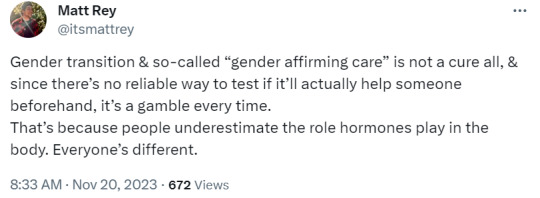
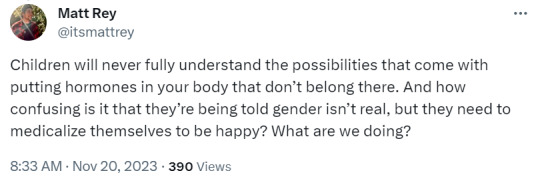

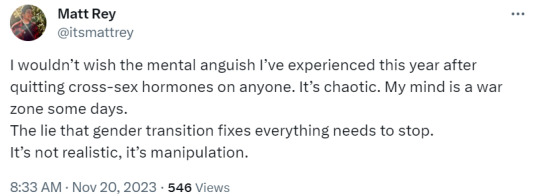
Effects of puberty blockers on males
Effects of puberty blockers on females
Cross-sex hormone use in males (female-typical levels of estrogen and testosterone) has a host of detrimental effects to the body.
Cross-sex hormone use in females (high testosterone) has a host of detrimental effects to the body.
#transgenderism#transgender ideology#ftm#mtf#gender fluid#non-binary#gender ideology#puberty blockers#testosterone#estrogen#hrt#hormone replacement therapy#cross-sex hormones
199 notes
·
View notes
Quote
These medications are well studied and have been used safely since the late 1980s to pause puberty in adolescents with gender dysphoria. They have been used routinely for even longer in children who enter puberty too early and in adults with a range of other medical conditions. ... But despite the evidence for the safety and efficacy of puberty-delaying treatments, some lawmakers across the U.S. have spread false claims about the drugs and other gender-affirming treatments as part of their efforts to ban or severely restrict access to health care for transgender people.
Scientific American spreading some actual facts about puberty blockers
481 notes
·
View notes
Text
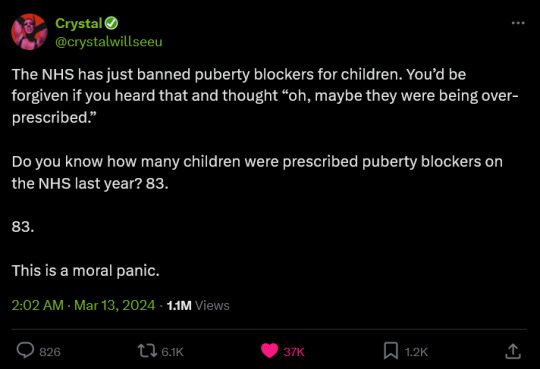
#puberty#lgbtqia#lgbtq community#lgbt pride#lesbian#nonbinary#sapphic#nonbinary lesbian#queer#lgbtq#gay girls#teenagers#queer community#queer nsft#queer artist#queer ns/fw#puberty blockers#nhs#fuck the nhs
85 notes
·
View notes
Text
Children will die.
381 notes
·
View notes
Text
This is huge. I hope the US takes notice.
105 notes
·
View notes
Text

"A trio of health care bills enshrining access in Colorado to abortion and gender-affirming procedures and medications became law Friday [April 14th] as the Democrat-led state tries to make itself a safe haven for its neighbors, whose Republican leaders are restricting care.
The main goal of the legislation signed by Democratic Gov. Jared Polis is to ensure people in surrounding states and beyond can go to Colorado to have an abortion, begin puberty blockers or receive gender-affirming surgery without fear of prosecution. Bordering states of Wyoming and Oklahoma have passed abortion bans, and Utah has severely restricted transgender care for minors...
The governor’s office was packed with lawmakers, advocates and health care providers, many of them women, for a ceremony with a celebratory feel that resembled a rally at times with loud applause and call-and-response chants.
“We see you and in Colorado, we’ve got your back,” Democratic state Sen. Julie Gonzales said during the ceremony.
With the new laws, Colorado joins Illinois as a progressive peninsula offering reproductive rights to residents of conservative states on three sides. Illinois abortion clinics now serve people living in a 1,800-mile (2,900-kilometer) stretch of 11 Southern states that have largely banned abortion...
Colorado’s southern neighbor, New Mexico, is also controlled by Democrats and signed a similar abortion protection bill earlier this year. It legally shields those who seek abortions or gender-affirming care, and those who provide the treatments, from interstate investigations...
Polis added the first layer of abortion protection a year ago, signing an executive order that bars state agencies from cooperating with out-of-state investigations regarding reproductive healthcare. One of the bills he signed Friday codifies that order into law. Like the New Mexico law, it blocks court summons, subpoenas and search warrants from states that decide to prosecute someone for having an abortion.
Colorado’s abortion law extends the protections to transgender patients dodging restrictions in their own states. Gender-affirming health care has been available for decades, but some states have recently barred minors from accessing it, even with parental consent. Hospitals in some of those states say gender-affirming surgeries are rarely recommended for minors anyway. Puberty blockers are more common.
Also on Friday, Polis signed a measure that outlaws “deceptive practices” by anti-abortion centers, which are known to market themselves as abortion clinics but don’t actually offer the procedure. Instead, they attempt to convince patients to not terminate their pregnancies. The bill also prohibits sites from offering what’s called an abortion pill reversal — and unproven practice to reverse a medical abortion...
A third bill signed Friday requires large employers to offer coverage for the total cost of an abortion, with an exception for those who object on religious grounds. It exempts public employees because Colorado’s constitution forbids the use of public funds for abortions."
-via AP News, 4/14/23
#colorado#new mexico#abortion#abortion access#pro choice#gender affirming care#gender affirming surgery#puberty blockers#illinois#united states#us politics#reproductive rights#safe haven#jared polis#democrats#good news#hope
594 notes
·
View notes
Text
The Health Service in the U.K. has decided that it will no longer prescribe puberty blockers to children and minors due to insufficient evidence of their safety. In a public statement a spokesman for the NHS said:
"We have concluded that there is not enough evidence to support the safety or clinical effectiveness of puberty suppressing hormones to make the treatment routinely available at this time.”
Of course there isn't.
As I've often remarked, we are still researching the long term effects of consuming red meat, and yet we are thoroughly certain of the long term safety of administering a treatment of this nature to young children? But certain parties in the United States have decided to place ideology above a common sense concern for the well being of children. It is very important to certain people for the male/female man/women distinction to be undermined within the culture, and any thing that advances that goal is reflexively and zealously promoted by them. The full reason for this goes beyond concern for sufferers of Gender Dysphoria, it is far deeper than that. There are a host of implications that potentially follow from the realization that men and women are naturally different, and the ideological Left despises all of them. The term Feminism itself was invented in the 19th century by a man named Charles Fourier (one of the first Socialist thinkers) who believed that the distinction between men and women had to be entirely erased so that individual humans become interchangeable.
But this would not be the first time that ideological zeal on the Left got ahead of a basic concern for the well being of children.
74 notes
·
View notes
Text
UK petition: Sandyford Clinic [Scotland] to immediately continue to prescribe trans kids hormone blockers
[ Sign here ]
Following the Cass Review, trans kids are no longer able to receive puberty blocker prescriptions from Sandyford, Scotland's only gender identity clinic for under 18s.
This is devastating news for trans kids who will now see their bodies change in ways that will trigger dysphoria. It will ultimately cost lives as trans kids are driven to suicide. All this will happen because of some despicable, manufactured "trans debate", where trans kids, and adults, are being used as a scapegoat for society's problems.
Trans charities and advocate groups are condemning the awful Cass Review all over the country. The only groups celebrating this dreadful document are anti-trans ones.
Hormone blockers have been used for decades safely, and the vast majority of trans kids that go on to transition are happy.
A common argument against blockers is that trans kids are not old enough to make such decisions. This is exactly what puberty blockers are for; to hit the pause button on any irreversible changes; to give trans kids time to make these decisions.
We urge Sandyford clinic to immediately resume providing trans kids with their life-saving puberty blockers.
[ Sign here ]
#petition#UK#projects#cass review#cass report#armchair activism#puberty blockers#sandyford clinic#scotland#trans
451 notes
·
View notes
Text
AGAIN???!!!
ARE. YOU. JOKING?!!!
This didn’t last the last time the consevatives tried to pull this stunt and frankly I don’t expect to last long this time given the obvious detrimental effects to deny kids trans healthcare but that doesn’t make this any less sickening!
The way tories play with the lives of trans kids as a political football is disgusting! I can’t even imagine the disruptions that being blocked access to puberty blockers, twice in such a short period could have on vulnerable trans kids but I know it must be horribly distressing and destabilising.
At this point, I can’t help but wonder if the tories strategy to ‘deal’ with the trans ‘problem’ is psychological warfare! Doing their best to make life as confusing, dangerous and detrimental to trans youth to scare them away from transition altogether!
DONT LET THIS GO UNNOTICED! DONT LET THEM THINK THEY CAN GET AWAY WITH THIS, AGAIN!
#transgender#trans#trans youth#protect trans kids#trans uk#puberty blockers#nhs#is a fucking joke#fuck the conservatives#tory scum#uk politics#trans politics
72 notes
·
View notes
Text
My centaur brother told my transphobic father I was probably trans while I was trying to come out to him. In a middle school cafeteria which was actually a Denny's? I was put on puberty blockers and my centaur brother galloped away.
#dream#transphobia tw#brother#father#centaur#trans#coming out#cafeteria#middle school#denny's#puberty blockers
350 notes
·
View notes
Text
We have a serious problem
Michael Laidlaw, MD: I'm a board-certified endocrinologist, practicing in private practice for the last 16 years. I've been studying and publishing in this area for the last 5 years, including peer reviewed journals such as Journal of of Clinical Endocrinology and Metabolism, and others. I also have a patient who is a detransitioner.
I think it's important to note that studies are shown that desistance, or growing out of this condition, of children by adulthood is very high. It's some 50-98%.
I want to be sure before I give someone a very powerful hormone like Insulin that they in fact have diabetes.
What about cancer? Before we give any powerful agents such as chemotherapeutics or surgeries, we certainly want to have physical evidence of this problem, such as biopsies or imaging.
Now, the gender affirmative therapy treatment proposed by WPATH gives very powerful hormones and surgeries on what basis? Where can we find the gender identity to be certain that these children will not desist by adulthood? Can we use imaging of the brain or blood tests, genetic testing, are there other biomarkers to ensure that we are correct? There is no such thing.
Julia Mason, MD: The Endocrine Society put out guidelines in 2017, and they were very careful in the guidelines. One, to point out that the evidence was of low and very low quality. And they also said in the guidelines that they have no idea how you identify which kids are trans and require this treatment.
And then the American Academy of Pediatrics the next year just leapt into that void and said, oh, oh, we'll tell you how you know which kids. You ask them.
Prior to 2018 I had maybe one trans patient. But then there was another one. And another one. And another one.
It wasn't until later that I started asking questions like, wait, every single kid I send to the gender clinic gets put on puberty blockers or cross-sex hormones. Just, it was happening immediately.
Patrick Hunter, MD: This affirmative model of care has spread wildly in the last 8 years. Now we have objective, unbiased systematic reviews. These systematic reviews tell us the evidence for youth transition is poor quality, and with very low certainty for benefit.
In JAMA Pediatrics, there was a study reported from Northwestern University in Chicago. Patients ranged in age from 13 to 24 years. The authors concluded that mastectomy was beneficial and should not be delayed in youth. What lead them to that conclusion? The finding that 3 months after surgery, the 36 patients were happy with their flat chests. They lost 9% of their surgical cases to follow-up. Nine percent. In 3 months.
It is absurd, meaningless to draw any conclusions after 3 months.
This paper is indicative of the quality of research we have in this field, published in our most prestigious journals.
We have a serious problem.
#gender ideology#queer theory#medical transition#desistance#detrans#sex trait modification#genderwang#detransition#trans identity#cross sex hormones#wrong sex hormones#puberty blockers#poor research#medical malpractice#medical scandal#medical corruption#endocrinology#low quality#ideological capture#ideological corruption#religion is a mental illness
910 notes
·
View notes
Text


sad that this young woman has had her health damaged so severely by puberty blockers, but is so scared of being excommunicated by her ingroup for even considering what terfs are saying that she feels the need to spit such disgusting performative bile at other women. when the evil radfems have been the ones warning about these dangerous hormones all along.
765 notes
·
View notes
Text
Zinnia Jones (May 31, 2021). "Early use of masculinizing steroid oxandrolone in trans boys can add 2 more inches of height compared to testosterone." Gender Analysis. Live link. Archive.
The above blog post is about a study about looking for more suitable sorts of puberty blocking and hormone therapy for transmasculine youth. It found a treatment that is more effective for letting them grow up to be a couple inches taller, if they start it early, at age thirteen or fourteen. It's about this study:
Grimstad, F. W., Knoll, M. M., & Jacobson, J. D. (2021). "Oxandrolone Use in Trans-Masculine Youth Appears to Increase Adult Height: Preliminary Evidence." LGBT health, 8(4), 300–306. https://doi.org/10.1089/lgbt.2020.0355
#rated PG#the content on the blog post itself is PG and SFW but be forewarned that other posts on the blog are PG-13 though educational#Zinnia Jones#transgender#transgender youth#youth#queer youth#youth health#puberty blockers#hormones#hormone therapy#hormone replacement therapy#HRT#oxandrolone#FTM#trans masculine#trans masc#relevant for transgender men and trans masculine nonbinary people and others on the female to male spectrum#links#queue#height#transition
57 notes
·
View notes